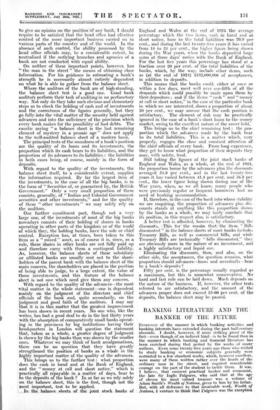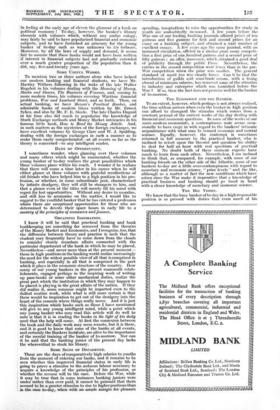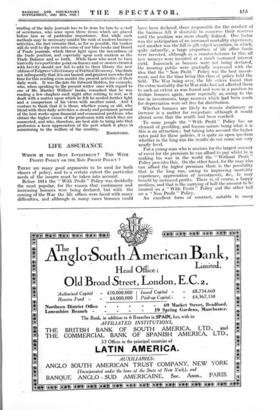BANKING LITERATURE AND THE BANKER OF THE FUTURE
EVIDENCE of the manner in which banking activities and banking _interests-have extended during the past half-century abounds. I doubt, however, if more striking proof of the fact—even thougli.of an indirect kind—is to be found than in the manner in which banking and financial literature has been enriched during that period by the works of many authors. Even some twenty-five years ago those who wished to study banking or economic subjects generally were restricted to a few standard works, which, however excellent, were many of them written rather over the heads of the ordinary man in the street, and required considerable courage on the part of the student to tackle them. It was, I believe, that eminent practical banker and economist, the late Sir Inglis Palgrave, who said that at the age of eleven his most valued treasure was a volume of Adam Smith's Wealth of Nations, given to him by his father. But, with all deference to that invaluable work, Wealth of Nations, I venture to think that ralgrave was the exception -in feeling at the early age of eleven the glamour of a book on political economy ! To-day, however, the banker's library abounds with volumes which, without any undue eulogy, may fairly be said to have popularized financial and economic subjects, and to have furnished an armoury for the young banker of to-day such as was unknown -to his forbears. Moreover, by all the laws of supply and demand, it seems fair to assume that these books would not have been written if interest in financial subjects had not gradually extended over a much greater proportion of the population than it did, say, five-and-twenty years ago.
SOME USEFUL WORKS.
To mention two or three authors alone who have helped our modern banking and financial students, we have Mr. Hartley Withers following in the wake of the late Walter Bagehot in his volumes dealing with the Meaning of Money, Stocks and Shares, The Business of Finance, and, coming to more modern times, his volumes covering Wartime financial problems, War and Lombard Street, and so forth. Then, on actual banking, we have Moxon's Practical Banker, and admirable books of modern times written by Mr. Ernest Sykes, and also by Mr. F. E. Steele. The late Charles Duguid in his time also did much to popularize the knowledge of Stock Exchange methods and Money Market intricacies in his famous little book, How to Read the Money Article. And, in such matters as the mysteries of the foreign exchanges, we have excellent volumes by George Clare and W. J. Spalding, dealing with the foreign exchanges in such a manner as to make them easily comprehended—at all events so far as the theory is concerned—to any intelligent reader.
DAYS OF OPPORTUNITY.
I sometimes wonder, when glancing over these volumes and many others which might be enumerated, whether the young banker of to-day realizes the great possibilities which these volumes place within his reach. I wonder if he realizes that there will come a time later in his career when he will either glance at these volumes with grateful recollections of old friends who have helped him to a high position in his pro- fession, or whether, in some subordinate post, characterized by infinite drudgery, they will still be strangers to him, and that a glance even at the titles will merely fill his mind with regret for lost opportunities. Without any desire to moralize, and still less to sermonize on the matter, I would like to suggest to the youthful banker that he has entered a profession where there are exceptional opportunities for those who are determined to devote their spare hours in early life to a mastery of the principles of economics and finance.
OBTAINING INSPIRATION.
I know it will be said that practical banking and bank bookkeeping are something far removed from the theories of the Money Market and Economics, and I recognize, too, that the difference between theory and practice is such that the student may frequently have to come down from the clouds to consider closely mundane affairs connected with the particular department of the bank in which he may be placed. Nevertheless—and never more than at the present moment— those in high positions in the banking world realize increasingly the need for the widest possible view of all that is comprised in banking, and especially in all that is comprised in the part which it plays in the economic structure of the country. How many of our young bankers in the present mammoth estab- lishments, engaged perhaps in the inspiring work of writing up pass-books or some other mechanical duties, realize the great part which the institution in which they may happen to be placed is playing in the great affairs of the nation. if they did realize it, some romance might be imparted even to the dullest routine work, while what is still more certain is that there would be inspiration to get out of the drudgery into the heart of the concern where things really move. And it is just this inspiration which books such as those I have mentioned will give to any young intelligent* mind, while a point which any young banker who may read this article will do well to note is that it is in reading the books in the light of his daily work that the help will come. At first the connexion between the book and the daily work may seem remote, but it is there, and it is good to know that some of the banks at all events, and certainly the Bankers Institute, are alive to the importance of the mental -training of the banker of to-morrow. Nor can it be said that the banking junior of the present day lacks the wherewithal to stock his -library.
SOME SIGNS OF DECADENCE.
These are the days of comparatively high salaries to youths from the moment of entering our banks, and it remains to be seen whether this improved financial aatus in early life is going to prove a stimulus to the arduous labour necessary to acquire a knowledge of the principles of his profession, or whether the reverse will be the case. Before the War, while it may be true that in some instances banking juniors were under rather than over paid, it cannot be gainsaid that there seemed to be a greater stimulus to rise to higher positions than is the ease to-day, when with an ample margin for pleasure
spending, temptations to miss the opportunities for study in youth are undoubtedly increased. A few years before the , War one of our leading banking journals offered prizes of ten guineas and five guineas for first and second prizes for an essay on a banking subject, and obtained- a vast number of excellent essays. A few years ago the same journal, with an increased circulation, offered in a similar prize essay competi- tion a first prize of one hundred guineas and a second prize of fifty guineas ; an offer, moreover, which obtained a good deal of publicity through :the public Press. Nevertheless, the entries in the second competition were fewer than in the pre- War competition when -the prize was smaller. The general standard- of merit too was clearly lower. .Can it be that the introduction of guilds and semi-trade unions, with a fixing almost of minimum -salaries, has removed some of the stimulus to industry and enterprise which was furnished before the War ? If so, then the fact does not promise well for the banker of to-morrow.
THE ECONOMIST AND THE BANKER.
To an extent, however, which perhaps is not always realized, the time seldom arrives when even the banker in high position can afford to disregard the stimulus which comes from a constant perusal of the current works of the day dealing with financial and economic questions. In some of the works of our more modern economists, a contemptuous note seems occa- sionally to have crept in with regard to the bankers' intimate acquaintance with what may be termed economic and mental science. Equally, however, the contempt is sometimes returned in full measure by the practical banker, who is inclined to retort upon the theorist and question his ability to deal for half an hour with real questions of practical banking. No doubt both of these eminent experts have much to learn from each other. Nevertheless, I am inclined to think that, as compared, for example, with some of our banking friends on the other side of the Atlantic, some of our bankers to-day are a little over-contemptuous with regard to monetary and economic science, " price levels " and the like, although as a matter of fact the new conditions which have arisen since the War make it imperative that a knowledge of practical business and banking should go hand in hand with a closer knowledge of monetary and economic science.
THE BIG VISION.
We know that the busy banker of to-day in a high responsible position is so pressed with duties that even much of his
reading of the daily journals has to be done for him by a staff of secretaries, who seize upon those items which are placed before him as of particular importance. But while such methods may be necessary amidst the rush of modern business activities, the fact remains that, as far as possible, the banker will do well to dip even into some of our blue-books and Board IA Trade journals, which throw light upon the inwardness of the trade position, and especially upon such matters as the Trade Balance and so forth. While those who want to turn hurriedly to a particular point on finance and economics treated with brevity should not fail to add to their library the new edition of Palgrave's Dictionary of Political Economy. One finds not infrequently thfitit is our busiest arid greatest men who find time for this reading even amidst the present activities of their daily work. It was thelate Sir Edward Holden, for example, who, when speaking to the present writer once with regard to one of Mr. Hartley Withers" books, remarked that he was reading a few chapters each night after retiring to rest, as it dealt with a matter upon which he felt he needed further light and a comparison of his views with another mind. And I venture to think that it is those, whether young or old, who' blend with their daily activities a steady and persistent perusal of the best works upon financial and economical problems who obtain the higher vision of the profession with which they are connected, and who, therefore, are best able to bring into that profession a keen appreciation of the part which it plays in ministering to the welfare of the country.
Booxwoax.




























































 Previous page
Previous page